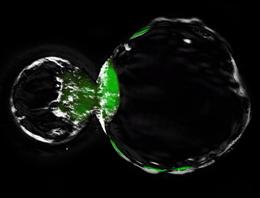Cloned human embryo makes working stem cells
October 6, 2011 | Source: Nature News

Blastocysts created by somatic cell nuclear transfer can be a source of embryonic stem cells (credit: The New York Stem Cell Foundation)
Scientists at the New York Stem Cell Foundation Laboratory have reprogrammed an adult human egg cell to an embryonic state using cloning technology and created a self-reproducing line of embryonic stem cells from the developing embryo.
In so doing, they have managed a feat that has at times been thought impossible, then inevitable, then completed, then incomplete and unfeasible. Their work is published today in Nature.
The researchers ran a series of experiments using 270 eggs from 16 donors, isolating the three key events of conventional cloning techniques to see which was causing the problem. The culprit turned out to be removing the egg’s DNA. So the group left it in, the reprogramming worked and an embryo — albeit one with an extra set of chromosomes from the egg — developed to the blastocyst stage, comprising 70–100 cells, from which stem cells can be derived.